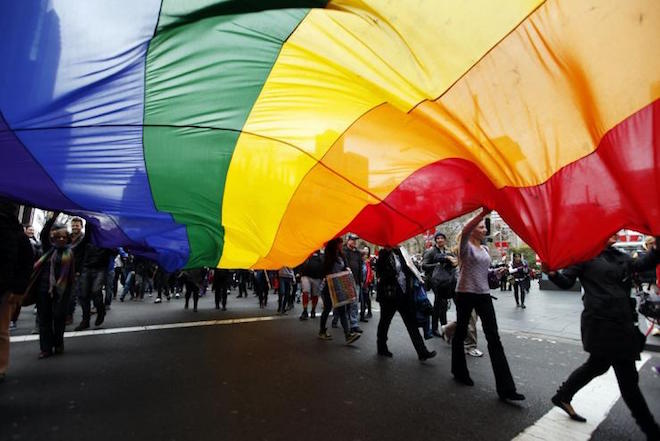Mental as anything
 Graham Hyrce •
Graham Hyrce •  Saturday, October 15, 2016
Saturday, October 15, 2016 Pleb-O-Cite ... Same sex marriage ... The debate has already attracted some pretty nasty and hurtful comments ... A campaign could get quite lunar ... But media lawyer Graham Hryce argues that using the mental health argument to close off discussion is a step too far

NOW that the Labor Party has announced its opposition, it is unlikely the marriage equality plebiscite will be held.
Prime Minister Turnbull, however, under pressure from the conservative wing of the Coalition, has indicated that he will press on with trying to get the plebiscite enabling legislation through the parliament - even though it faces almost certain defeat in the senate.
It follows that marriage equality will be unresolved for the foreseeable future.
One troubling aspect to emerge is of concern to supporters of free speech and public debate - namely the adoption by the Labor Party, the Greens and some Aboriginal leaders of the argument against the plebiscite based on adverse effects that a public debate may have on the mental health of members of the LGBTI community.
Opposition leader Bill Shorten and deputy opposition leader Tanya Plibersek have endorsed and adopted this argument. The mental health argument was at the forefront of the Labor and Greens opposition to the plebiscite.
The same argument has also recently been taken up by Aboriginal leaders, including Professor Marcia Langton and Labor MP Linda Burney, to urge Malcolm Turnbull to ditch the plebiscite on the basis that it will adversely affect the proposed referendum on Aboriginal constitutional recognition, which is due to be held in the next few years.
There are a number of facts which are not in dispute, including:
• Gay marriage will be legalised in Australia at some time.
• This can only occur by a vote of the federal parliament.
• A majority of Australians support gay marriage. A minority, including those with religious objections, do not.
• A majority of federal parliamentarians support gay marriage.
• The right wing of the Coalition government and Catholic and some trade union elements within the Labor Party oppose gay marriage.
• The proposal for a plebiscite on marriage equality emerged as a compromise between the right and moderate wings of the Abbott Coalition government, and Malcolm Turnbull agreed to conduct the plebiscite in order to obtain right wing support to overthrow Tony Abbott and become Prime Minister.
• The Turnbull government proposed that the plebiscite be held early next year and legislation to enable that to happen is currently being debated in Federal parliament.
 Those who oppose the plebiscite do so on numerous grounds, including: that it is a product of the crude political cynicism of politicians; that it has no constitutional basis and the result will not be binding on federal parliamentarians; that it is contrary to the basic tenets of representative democracy in so far it takes law making out of the hands of elected politicians; and it will cost the best part of $200 million.
Those who oppose the plebiscite do so on numerous grounds, including: that it is a product of the crude political cynicism of politicians; that it has no constitutional basis and the result will not be binding on federal parliamentarians; that it is contrary to the basic tenets of representative democracy in so far it takes law making out of the hands of elected politicians; and it will cost the best part of $200 million.
Those arguments have now carried the day with a significant number of federal parliamentarians - the Greens, the Labor Party and crossbenchers in the Senate, all opposed to the marriage equality plebiscite.
In these circumstances, recourse to an argument against the plebiscite based on the mental health effects of public debate on the LGBTI community seems unnecessary.
It's understandable that the Labor Party has embraced this argument. In part, it wishes to appear supportive of the LGBTI community so that it can rewrite its own history on the topic of marriage equality.
It wants us to forget that Prime Minister Gillard opposed legalising gay marriage in deference to her trade union power base, and that the Catholic wing of the party still opposes it. Bill Shorten previously supported a plebiscite, but now opposes it so that he can exacerbate the deep divisions within the Coalition on the issue.
Shorten's politics on marriage equality is just as cynical as Turnbull's. The prime minister may have to support a plebiscite in order to remain in office, but at least his personal commitment to marriage equality has never been in doubt. And, to his credit, Turnbull has rejected the mental health argument so eagerly embraced by Shorten.
When it was put to him in parliament this week Turnbull responded by asking whether all Australians were to be denied the opportunity to engage in public debate because fringe groups may behave inappropriately.
Some Aboriginal leaders appear to have adopted the argument because they see a link between opposition to marriage equality and opposition to indigenous constitutional recognition. However, this appears tenuous at best.
The issues are quite separate and as Turnbull pointed out the mental health argument could also be deployed to prohibit debate in relation to the upcoming referendum on indigenous constitutional recognition.
There are a number of reasons why mental health should be rejected as an argument, even by those who oppose the plebiscite.
First, it is fundamentally flawed. No matter whether a plebiscite is held or not, the public debate over marriage equality will continue - and that is as it should be. In a functioning liberal democracy the right to engage in vigorous public debate on matters of public importance must always prevail over the fact that such debates may offend or otherwise adversely affect some members of the community.
Secondly, the argument is not valid. There is no compelling evidence to suggest that public debate has any adverse mental health effects on any group in the community, including the LGBTI community.
Thirdly, the argument stigmatises the LGBTI community as being mentally fragile and demeans it by so doing. The argument is inherently paternalistic and brands the LGBTI community as victims unable to even argue in favour of their own cause.
Not only is such a characterisation demeaning, it is false. Whether one agrees with the politics of the LGBTI community or not, it cannot be disputed that those who carried on the political struggle for gay rights since the 1960s did so by engaging in vigorous public debate. We would not be arguing now about marriage equality if public debate had been prohibited in the past.
As with all groups which have historically been denied basic rights, (including Aboriginals), public debate was a crucial component of their struggle for equality and recognition.
Finally, and most importantly, the mental health argument constitutes a fundamental attack on the right to free speech, and its logical consequence is to abolish public debate in its entirety.
Such a consequence is completely unacceptable in a liberal democratic society where social change is brought about, in large part, by engaging in public discussion.
Those who have adopted the argument do not seem to realise that it can be utilised by any interest group to shut down public dialogue on any topic.
For example, Muslims could seek to close off debate on radical Islamic terrorism by asserting that such a debate would have adverse psychological effects on members of their community. It could even be utilised by conservative religious groups to argue that there should be no debate on marriage equality.
In any event, the suggestion that public discussion should be thwarted on a matter in respect of which Australian voters may be compelled by law to vote is untenable.
For all of these reasons the mental health argument against the marriage equality plebiscite should be rejected.
 Marriage equality,
Marriage equality,  Plebocite
Plebocite 








Reader Comments